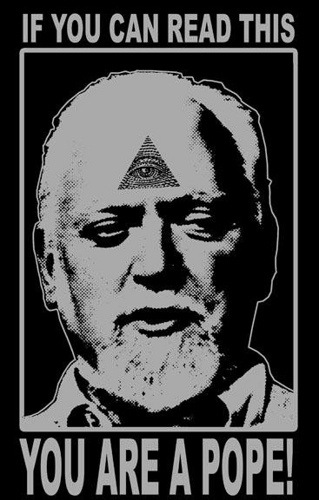

I first read Robert Anton Wilson in 1985, which also happened to be my Weirdest Summer Ever. After freshman year at college back East, I went to Berkeley and lived with my high school girlfriend in Barrington Hall, the most legendary and notorious of Berkeley's student-run co-ops, already sunk into a long sunset of countercultural haze. The place smelled like cat pee and cheap incense, and the cries of weird rituals and speed deals gone awry echoed through hallways covered with wondrous and faded hippie murals. Graffiti captured the unnerving tenor of the place: a large "LSD" had been spray-painted on Haste Street to the north in order to jog the memories of any high-flying trippers who might have made their way to the roof, while a mystical phrase from Lao Tzu — "Those who know do not say, those who say do not know" — somehow took on ominous overtones once it was tagged across one wall, a hint of the foreboding secrets and cosmic conspiracies that would nip at my heels all summer long until by the time I fled east I barely escaped without a drug addiction or, even more dangerous, the unspoken Answer to the Riddle.
It didn't help that I spent the summer reading Aleister Crowley, Phil Dick, the Principia Discordia, and Robert Anton Wilson, especially the Illuminatus! Trilogy, Prometheus Rising, and Cosmic Trigger. Or maybe this was the only stuff that actually did help — and especially RAW, who taught me, as he taught so many others, to nimbly dodge the gravity wells that threaten to suck us down the various informational reality tunnels that make a Swiss cheese of our consensus trance. A year ago I traded a bunch of books to a Russian teenager who sent me a couple of samizdat copies of my book Techgnosis, translated into Russian. He liked Terence McKenna and wanted me to send him more books that would tug the silly putty of his world with humor and verve. He was about the same age I was when I had my Weirdest Summer Ever. And so RAW — and especially the two indispensable nonfiction books listed above — topped the list. He appreciated them.
I got to see RAW give a few talks and workshops, but didn't meet the man until a year or so before his death. Every Wednesday a group of friends and supporters, including some utterly charming female care-givers, would gather at his Santa Cruz apartment and read through Joyce's Finnegans Wake — which basically meant reading half a paragraph and then watching RAW unpack it with extraordinary finesse, humor, and erudition, revealing the text to be a palimpsest of possibilities dependent on the mind of the reader to unfurl. (This was one thing that linked him to McKenna.) Before the group bull session began, as the sun slipped into the Pacific, I hung out with RAW on his balcony. Deep in my own investigations into the history of California esoterica, I pressed him on biographical information, especially about the early-70s East Bay psychedelic and occult underground that forms the invisible backdrop of Cosmic Trigger. But he avoided my questions and invitations to stroll (or sneak) down memory lane; instead, he stuck to more-or-less familiar ideas about general semantics, cognitive filters, and mind viruses. His personal life lay in a galaxy far, far away.
What impressed me most about the evening was not RAW's scintillating Joyce readings or his continued devotion to the broad and fertile set of ideas he explored in his many books. Instead it was his attitude towards his own physical infirmity. In addition to whatever unspoken indignities he was forced to endure and had the good grace to leave unmentioned in the gathering, he had a terribly difficult time moving his body forward once he had settled himself back into the sofa. The simple act of leaning forward took him minutes to perform, but perform it he did, without aid. He may have just been stubborn, but he seemed rather to simply be manifesting his own amused and bemused attitude toward the absurdities of life, his own struggle with the cornball mystery.
RAW has long been a fiercely independent thinker and writer, and he performed that independence for us and himself as he took those excruciating moments to eek his body forward from the sofa. Of course, you pay a cost for fierce independence. Indeed, when I came to understand RAW's precarious financial situation, I was struck with the realities of what a life on the cognitive fringe can leave you materially in your dotage. At the same time, the evening was also a testament to the community of care that had "anarchically" formed around him, a local crew of cannabis activists, alternative thinkers, and very friendly freaks that RAW himself had unknowingly helped seed through his books and ideas. This particular feedback loop was deeply moving.
In October of 2006, Douglas Rushkoff, another mind permanently marked by RAW's unique semantic hieroglyphs, helped raise a good deal of cash for the man's hospice care in a web-driven campaign that anticipated the crowdfunding logic of Kickstarter by several years. Other networks that helped spread the word that year included Slashdot, innumerable weirdo listservs, and, of course, Boing Boing — old-school nethead cultural nodes that were and are deeply marked by RAW's canny and skeptical mytho-logic, his data-dense cultural enthusiasm, and his wry and libertarian embrace of indeterminacy.


